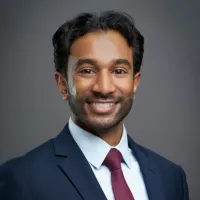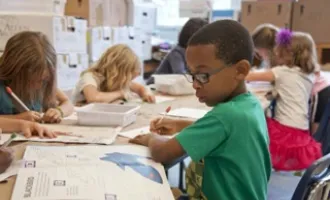
Sparking Hearts and Minds
“The sound of electronic heartbeats echoed from room to room as high schoolers from all over the Bay, equipped with their own stethoscopes, leaned in, listening to the beats and murmurs of a manikin’s heart, their faces lighting up as they identified irregularities — moments that could spark the beginning of a future in medicine.”
Cardiac Camp, founded by Nirosh Mataraarachchi, a fourth-year medical student at UCSF, provides a one-of-a-kind opportunity for high school students to explore the fascinating world of cardiovascular disease (CVD) through an immersive, hands-on experience.
Held annually at UCSF, Cardiac Camp goes beyond the typical summer program. Designed for students from diverse backgrounds, the camp not only teaches the fundamentals of heart health but also fosters mentorship and long-term support to help participants navigate their journeys into higher education and healthcare careers.
The 2024 session welcomed 26 students from a variety of backgrounds, with over 80% identifying as female and an ethnic breakdown of 50% Latino, 20% Black, and 25% Asian students. This emphasis on inclusivity reflects the camp’s mission to ensure that the future of medicine is as diverse as the communities it serves.
Beyond inspiring the next generation of healthcare professionals, Cardiac Camp is also a powerful initiative aimed at addressing health disparities, particularly among populations disproportionately affected by CVD.
Dr. Binh An Phan, Cardiac Camp’s faculty advisor and Professor of Medicine at UCSF, highlights its significance.
“Cardiac Camp is an incredibly important program that helps uplift high school students who otherwise may not have opportunities to consider careers in science and medicine. As the faculty advisor, I help sponsor and guide incredibly talented UCSF medical students responsible for administering the camp,” he said.
“Their outstanding commitment to serving the community, exemplary organizational skills, and amazing hard work are the key reasons for the camp’s success. I am so proud of their dedication to supporting the next generation of scientists and healthcare providers.”
With CVD disproportionately impacting Black and Latino communities, Cardiac Camp emphasizes recruitment of students from these backgrounds, providing them with early exposure to pipeline programs into healthcare.
For many, this experience is deeply personal.
“Cardiac Camp was a very welcoming program that introduced me to a new side of the medical field,” said Aliyah Thompson, a 2023 Cardiac Camp alum and senior at Castro Valley High School.
“Coming from an African American background, I have had family members who have suffered from cardiac diseases, including heart failure. After participating in Cardiac Camp, I gained information that I still apply in my daily life regarding the foods I eat and how I take care of myself. It also opened up my interest within the medical field — now I want to be a nurse!”
Since its inception in 2023 with just 10 participants, Cardiac Camp has grown rapidly. Recognized for its impact, Nirosh was named UCSF’s Student Leader of the Year in 2023, and the camp received the Justice, Equity, and Inclusion Award in 2024.
Interest in the program has skyrocketed, with over 300 applications submitted for the most recent session. Survey data from past participants indicates a significant increase in understanding of CVD and a strengthened interest in pursuing medical careers.
Kacee Chan, a 2023 alum and senior at Burlingame High School, emphasized the camp’s accessibility and the valuable exposure it provided.
“I enjoyed Cardiac Camp because a lot of competitive summer medical programs are mainly targeted towards white-predominant or higher-income students who can afford the fees,” Chan said.
“This opportunity allowed me to get a glimpse of medical school, especially through the lectures and interactions with medical students and doctors. I always recommend it to younger friends because I loved the mix of activities—from the surgery workshop to conducting a cardiac workup and even seeing real organs. The hands-on aspect made it such a unique experience!”
To maintain its commitment to equity, the application process includes questions designed to identify students from historically marginalized communities, particularly those affected by redlining and systemic inequities.
Factors such as residential zip code, family income, and parents’ educational background help ensure that opportunities are extended to those who need them most.
Unlike other summer medical programs, Cardiac Camp is entirely free to apply for, provides a stipend to attend, and is targeted for disadvantaged minorities, breaking down financial and racial barriers, making pipeline programs more accessible.
As the program looks ahead to its third iteration in July 2025, the team remains dedicated to expanding its reach and impact.
With each new cohort, Cardiac Camp continues to empower students, inspire future healthcare leaders, and reshape the landscape of healthcare—one heartbeat at a time.



